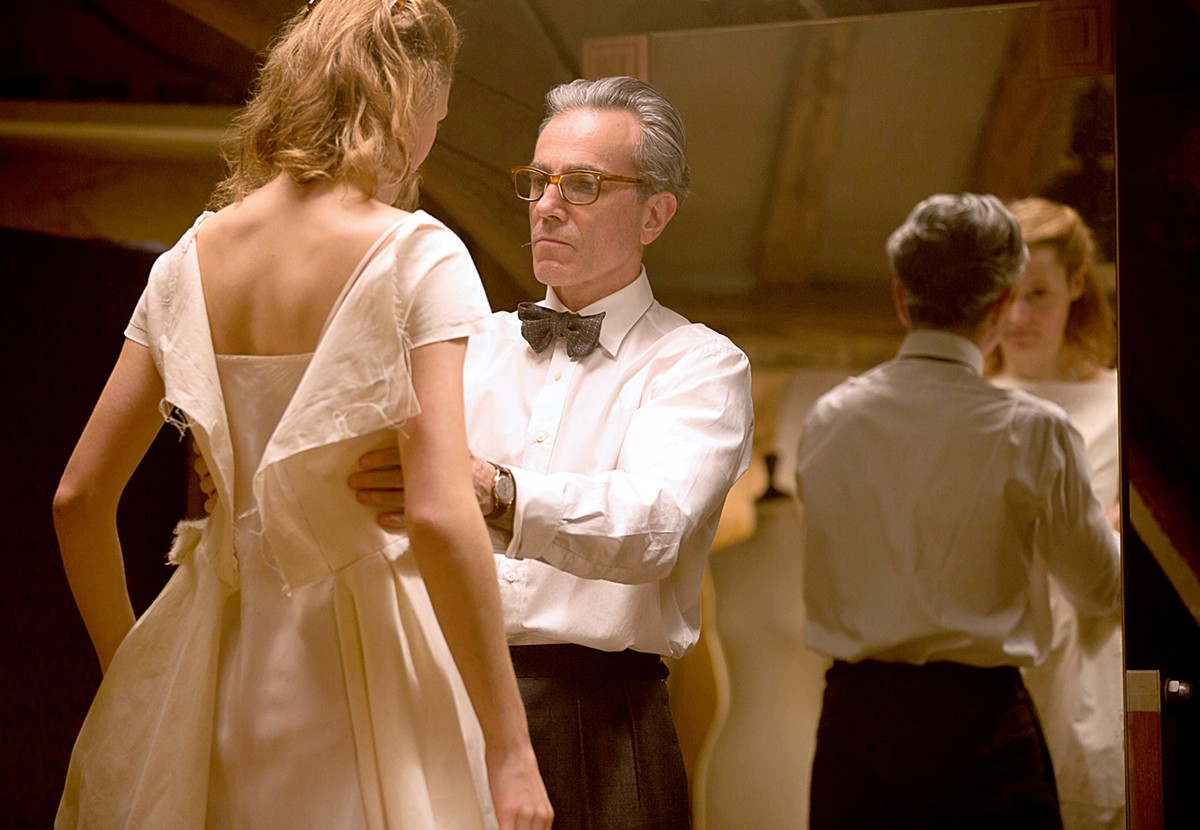Gloriously ornate, delicately refined, and yet coarse to the touch, the latest opus from the ever-evolving mega-auteur Paul Thomas Anderson (Boogie Nights, There Will Be Blood) is a beautiful and fragile synergy of form and function, with a nuanced style of storytelling that echoes the story being told. It is a heady film, one that wants you to chew on its rich themes, invites you to luxuriate in its exquisite craftsmanship, and linger on its gorgeous compositions and impeccable taste, all while weaving a narrative that works hard to keep the viewer at arm's length.
After threatening that this will be his final big screen role, the insanely committed star Daniel Day-Lewis gives a symposium on controlled fury as the semi-ludicrously named Reynolds Woodcock, a highly adept artist who seeks to extend his total mastery of his craft into controlling all aspects of his reality. Woodcock is a top designer in an impossibly elegant mid-1950s London, a dressmaker to heiresses, celebrities, socialites, and European royalty. He endeavors to make their exteriors as lovely as possible, even while barely masking his contempt for the abundant ugliness beneath the veneers. That volcanic contempt is forever lingering beneath a wall of icy reserve, shielded by a set of rules and exacting expectations which covers everything from his intricate stitch work to his preference for oil and salt with his asparagus spears.
Woodcock is surrounded by women (including his toxic and severe sister, played with frosty perfection by Lesley Manville) and has made fulfilling their fantasies and dreams his life's work, but only professionally; in his personal life women are utilities, accessories to drape his genius on and to absorb his veiled hostility.
This self-absorbed homeostasis is fatally disrupted by the arrival of Alma (Vicky Krieps), a fetching, youthful waitress with an unrefined intelligence but ample verve. But what begins as a disposable plaything becomes an all-consuming distraction — and ultimately much, much more. Krieps' elusive accent is hard to place (she hails from tiny Luxembourg) and her intonation bears hints of both German and French, which lends a gentle, pleasing layer of contradiction to her line readings. She is never less than captivating, and holds her own even as the mesmerizing Day-Lewis is busy swallowing everything in the vicinity into his vortex.
By simply and persistently insisting that he see her as a fully realized partner — as a living, breathing human deserving of his full attention and love — Alma begins unwinding the strands of the maestro's lonely kingdom. The movie then transitions into a Hitchcockian noir, filled with maternal longing, pop psychology, haunted passion, and a deeply weird and upsetting sensuality. The film's intense, moody, and mysterious tone drifts toward the outright sinister, but even while we head down darker and darker corridors, Anderson refuses to conform to our expectations. The director makes a meal out silences, to the extent that the volume of a knife scraping toast becomes a contentious issue. Meanwhile, his staging of the set pieces (such as when the camera floats over a rollickingly New Year's Eve Ball, while Reynolds desperately scans the room for his lover) is virtuosic.
Had it been made in the era of its setting, Phantom Thread would probably have been dismissed as a "women's picture" — something Anderson seems distinctly conscious of as he goes about spewing this acidic romance across a breathtakingly exquisite canvas.






